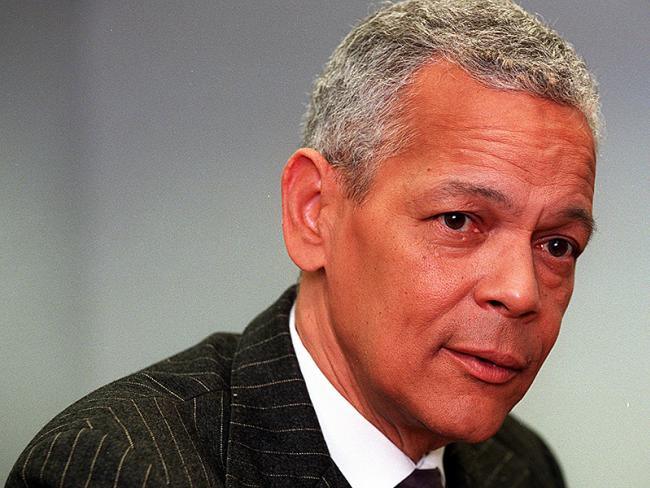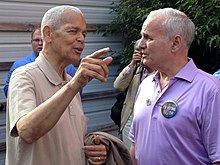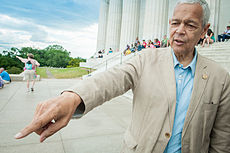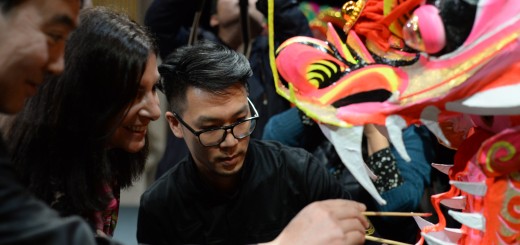JULIAN BOND

|
|
Dear jean paul,
Longtime People For the American Way board member Julian Bond died on Saturday at the age of 75.
President Obama rightly called him a hero in his statement yesterday, and said, “Justice and equality was the mission that spanned his life … Julian Bond helped change this country for the better. And what better way to be remembered than that.”
Julian was both a towering figure of the civil rights movement and a deeply humble man who was eager to contribute to the work of our organization.
There is much being written and talked about in tribute to Julian. He made history over and over again and was a force for progress in everything he did, whether as a student organizer and founding member of the Student Nonviolent Coordinating Committee … or as the founding president of the Southern Poverty Law Center … or as the longtime chairman of the NAACP … or as a Georgia state legislator.
This passage from a Sunday piece in the Atlanta Journal-Constitution provides a wonderful window into the progressive change to which Julian devoted his life:
After Selma and the passing of the Voting Rights Act in 1965, African-Americans around the South were finally able to run for office.
Bond was elected to the Georgia House of Representatives in 1965, one of 11 who were the first black members elected to the Georgia Assembly in 58 years, the result of reapportionment and a special election after the Voting Rights Act.
“It was exciting to be a pathbreaker,” he said.
However, just before he was to be seated in 1966, Bond voiced support for a SNCC statement that denounced U.S. involvement in the Vietnam War and sympathized with draft evasion. As a result, members of the Georgia Legislature accused Bond of treason and disorderly conduct, voting 184-12 to bar him from being seated.
Four days later, Dr. Martin Luther King, Jr. led a march of 1,000 people to the Georgia Capitol protesting Bond’s ouster.
For the next year Bond pushed his case through the judiciary system all the way to the U.S. Supreme Court, where he fought for his right to speak his mind in Bond v. Floyd. The Supreme Court ruled unanimously for him.
Julian was a leader for whom intersectionality was not a buzzword, but a principle he felt at the core of his being. He saw all the issues we work on as connected by a broad commitment to human dignity and equality.
I was reminded by a colleague over the weekend about Julian’s decision not to attend the 2006 funeral for Coretta Scott King because it was being held in the church run by a minister who was, in Julian’s words, a “raving homophobe.” Julian thought that Coretta Scott King, as a vocal advocate for LGBT equality, would be “twisting in her grave” about having her funeral there, and said he would twist in his if he attended. That was an incredibly powerful statement and act of solidarity with LGBT people, one that required personal sacrifice.
Especially at this important time in history, the nation and certainly this organization will miss the wisdom and guidance of Julian Bond. Thank you for all you do to help America live up to the ideals he championed.
Sincerely,

Michael Keegan, President
P.S. Many of America’s top news outlets are paying tribute to Julian with coverage, and I hope you’ll take a few minutes of your day to read a little bit about a dear friend and a man the AJC called a “civil rights titan.”
Here are just a couple of articles from:
The Atlanta Journal-Constitution>>
Horace Julian Bond (January 14, 1940-August 15, 2015), known as Julian Bond, is an American social activist and leader in the Civil Rights Movement, politician, professor, and writer. While a student at Morehouse College in Atlanta, Georgia, during the early 1960s, he helped to establish the Student Nonviolent Coordinating Committee (SNCC). Bond was elected to four terms in the Georgia House of Representatives and later to six terms in the Georgia Senate, having served a combined twenty years in both legislative chambers. From 1998 to 2010, he was chairman of the National Association for the Advancement of Colored People and the first president of the Southern Poverty Law Center.[4]
Contents
[hide]
Early life and education[edit]
Bond was born at Hubbard Hospital in Nashville, Tennessee, to parents Julia Agnes (Washington) and Horace Mann Bond. His father was an educator, former president of Lincoln University.[5][6] His mother Julia was a former librarian atClark Atlanta University.[7] At the time, the family resided on campus at Fort Valley State College, where Horace was president. The house of the Bonds was a frequent stop for scholars and activists and celebrities passing by, such as W. E. B. Du Bois and Paul Robeson. In 1945 his father was offered the position as the first African-American president ofLincoln University, and the family moved North.[8]
In 1957, Bond graduated from George School, a private Quaker preparatory boarding school near Newtown in Bucks County, Pennsylvania.[9]
Political organizing[edit]
On April 17, 1960, Bond helped co-found the Student Nonviolent Coordinating Committee (SNCC).[10] He served as the communications director of the SNCC from January 1961 to September 1966, where he traveled around Georgia,Alabama, Mississippi, and Arkansas to help organize civil rights and voter registration drives. Bond left Morehouse College in 1961 to work on civil rights in the South.[11] From 1960 to 1963, he led student protests against segregation in public facilities and the Jim Crow laws of Georgia.
He returned in 1971 at age 31 to complete his Bachelor of Arts in English.[12] With Morris Dees, Bond helped found theSouthern Poverty Law Center (SPLC), a public-interest law firm based in Montgomery, Alabama.[13] He served as its president from 1971 to 1979.[14] Bond continues to serve on the board of directors of the SPLC.[15]
Career[edit]
In 1965, Bond was one of eleven African Americans elected to the Georgia House of Representatives after passage of the Civil Rights Act and Voting Rights Act of 1965 had opened voter registration to blacks. By ending the disfranchisement of blacks through discriminatory voter registration, African Americans regained their ability to vote and entered the political process.[16] On January 10, 1966, Georgia state representatives voted 184-12 not to seat him because he had publicly endorsed SNCC’s policy regarding opposition to U.S. involvement in the Vietnam War.[17] They disliked Bond’s stated sympathy for persons who were “unwilling to respond to a military draft”.[18] A three judge panel on the United States District Court for the Northern District of Georgia ruled in 2-1 decision that the Georgia House had not violated any of Bond’s constitutional rights. In 1966, the United States Supreme Court ruled 9-0 in the case of Bond v. Floyd (385 U.S. 116) that the Georgia House of Representatives had denied Bond his freedom of speech and was required to seat him. From 1967 to 1975, Bond was elected to four terms as a Democratic member in the Georgia House. There he organized the Georgia Legislative Black Caucus.
In January 1967, Bond was among eleven House members who refused to vote when the legislature elected segregationist Lester Maddox of Atlanta as governor of Georgia over the Republican Howard Callaway. Callaway had led in the 1966 general election by some three thousand votes. The choice fell on state lawmakers under the Georgia Constitution of 1824 because neither major party candidate had polled a majority in the general election. Former Governor Ellis Arnall polled more than fifty thousand votes as a write-in candidate, a factor which led to the impasse. Bond would not support either Maddox or Callaway, although he was ordered to vote by lame duck Lieutenant Governor Peter Zack Geer.[19]
Throughout his House career, Bond’s district was repeatedly redistricted:
He went on to be elected for six terms in the Georgia Senate, in which he served from 1975 to 1987.
During the 1968 presidential election, Bond led an alternate delegation from Georgia to the Democratic National Convention in Chicago. There, contrary to his intentions, he became the first African American to be proposed as a major-party candidate for Vice President of the United States. While expressing gratitude for the honor, the 28-year-old Bond quickly declined, citing the constitutional requirement that one must be at least 35 years of age to serve in that office.
Bond resigned from the Georgia Senate in 1987 to run for the United States House of Representatives from Georgia’s 5th congressional district. He lost the Democratic nomination in a runoff to rival civil rights leader John Lewis in a bitter contest, during which Bond was accused of using cocaine and other drugs.[23] As the 5th district had a huge Democratic majority, the nomination delivered the seat to Lewis, who still serves in Congress.
In the 1980s and 1990s, Bond taught at several universities in major cities in the North and South, including American, Drexel, Harvard, and the University of Virginia.
In 1998, Bond was selected as chairman of the NAACP. In November 2008, he announced that he would not seek another term as chairman.[24] Bond agreed to stay on in the position through 2009, as the organization celebrated its 100th anniversary. Roslyn M. Brock was chosen as Bond’s successor on February 20, 2010.[25]
He continued to write and lecture about the history of the civil rights movement, and the condition of African Americans and the poor. He is President Emeritus of the Southern Poverty Law Center.
From 1980 to 1997 he hosted America’s Black Forum. He remained a commentator for the Forum, as well as radio’s Byline, and for NBC‘s The Today Show. He authored the nationally syndicated newspaper column Viewpoint. He narrated the critically acclaimed PBS series Eyes on the Prize in 1987 and 1990.
Julian Bond and Minnesota Governor Mark Dayton at a rally opposing a ballot initiative aimed at prohibiting same-sex marriage in that state in June 2012.
Bond has been an outspoken supporter of the rights of gays and lesbians. He has publicly stated his support for same-sex marriage. Most notably, he boycotted the funeral services for Coretta Scott King on the grounds that the King children had chosen an anti-gay megachurch. This was in conflict with their mother’s longstanding support for the rights of gay and lesbian people.[26] In a 2005 speech in Richmond, VA, Bond stated:
- African Americans … were the only Americans who were enslaved for two centuries, but we were far from the only Americans suffering discrimination then and now…. Sexual disposition parallels race. I was born this way. I have no choice. I wouldn’t change it if I could. Sexuality is unchangeable.[27]
In a 2007 speech on the Martin Luther King Day Celebration at Clayton State University in Morrow, GA, Bond said, “If you don’t like gay marriage, don’t get gay married.” His positions pitted elements of the NAACP against religious groups in the Civil Rights movement who oppose gay marriage. Most resistance came from within the Southern Christian Leadership Conference (SCLC), which was partially blamed for the success of the recent gay marriage ban amendment in California.[28]
Bond was a Distinguished Professor in Residence at American University in Washington, D.C. He was also a faculty member in the History Department at the University of Virginia at Charlottesville, where he taught history of the Civil Rights Movement until 2013.[29]
He was a strong critic of policies that contribute to anthropogenic climate change and was amongst a group of protesters arrested at the White House for civil disobedience in opposition to the Keystone XL pipeline in February 2013.[30]
Bond was on the Board of Selectors of Jefferson Awards for Public Service.[31]
Personal life[edit]
On July 28, 1961, Bond married Alice Clopton, a student at Spelman College. They divorced on November 10, 1989. They had five children: Phyllis Jane Bond-McMillan, Horace Mann Bond II, Michael Julian Bond (an At-large member of Atlanta’s City Council), Jeffrey Alvin Bond and Julia “Cookie” Louise Bond. He married Pamela S. Horowitz, an attorney, on April 26, 1991.
Legacy and honors[edit]
- 2002 – National Freedom Award [32]
- In 1999, an honorary LL.D. from Bates College.
- In 2008, an honorary degree from George Washington University. Bond was the 2008 Commencement Keynote Speaker.[33]
- In 2009, he was awarded the Spingarn Medal from the NAACP.[34]
- On October 1, 2009, an honorary L.H.D. from Macalester College.
The above four are among 25 honorary degrees which he has been awarded.[35]
Eyes on the Prize[edit]
Bond was the narrator of the PBS video Eyes on the Prize, recounting the civil rights controversies of the 1950s and 1960s.
Julian Bond: Reflection from the Civil Rights Movement[edit]
Julian Bond, during the filming ofReflections from the Frontlines of the Civil Rights Movement.
Bond is the protagonist on Julian Bond: Reflections from the Frontlines of the Civil Rights Movement, a documentary film byEduardo Montes-Bradley. Heritage Film Project, 2012. Distributed by Filmakers Library – Alexander Street Press, USA.[36]Color and Black and White, HD, 34 min. This film is a portrait of social activist and former Georgia legislator Julian Bond approaches the story of the Civil Rights Movement in the United States from a personal perspective. “Bond’s father was the first African-American president of Pennsylvania’s Lincoln University, and the family hosted black luminaries in education and the arts, but Bond recalls growing up in the era of “separate but equal” laws”.[37] Bond also talks about his early involvement with the Civil Rights Movement, his nomination at the age of 28 for vice president of the United States, and the Georgia legislature’s efforts to prevent him from being seated as a representative on the grounds that he had not supported theVietnam War. The film explores the 1963 March on Washington, Martin Luther King Jr., the assassinations of King and John F. Kennedy, and Lyndon B. Johnson‘s impact on U.S. race relations. On this film Bond also offers his own insights, and adds some personal revelations, such as the fact that he was a published poet during his college years. The film closes with a montage of major African-American figures from Frederick Douglass to Spike Lee. Julian Bond, Premiered at the Virginia Film Festival on November 4, 2012.[38]
Controversial comments[edit]
Bond was a strong critic of the Bush administration from its assumption of office in 2001, in large part because Bond believed the administration was illegitimate. Twice that year, first in February to the NAACP board and then in July at that organization’s national convention, he attacked the administration for selecting Cabinet secretaries “from the Taliban wing of American politics”. Bond specifically targeted Attorney General John Ashcroft, who had opposed affirmative action, and Interior Secretary Gale Norton, who defended the Confederacy in a 1996 speech on states’ rights. In the selection of these individuals, Bond said, Bush had appeased “the wretched appetites of the extreme right wing and chosen Cabinet officials whose devotion to the Confederacy is nearly canine in its uncritical affection.” Then House Majority Leader Dick Armey responded to Bond’s statement with a letter accusing NAACP leaders of “racial McCarthyism.”[39] Bond later added at the annual NAACP convention that year, that since Bush’s election he had “had his picture taken with more black people than voted for him.”[39]
On May 14, 2013, while on MSNBC, Bond called the Tea Party the “Taliban wing of American politics.”[40] Bond told MSNBC, “I think it’s entirely legitimate to look at the tea party.” But he also said, “It was wrong for the IRS to behave in this heavy-handed manner. They didn’t explain it well before or now what they’re doing and why they’re doing it.” He called Tea Party members “a group of people who are admittedly racist, who are overtly political, who’ve tried as best as they can to harmPresident Obama in every way they can.” He added, “We all ought to be a little worried about them.”[40]
Media appearances[edit]
During his tenure with the NAACP, Bond was frequently interviewed and appeared on numerous news shows. In 1978, he played himself in the miniseries King. He also had a small appearance in the movie Ray (2004).
Bond hosted Saturday Night Live (SNL) on April 9, 1977, becoming the first black political figure to host the show. The famous segment from this appearance is the “Black Perspective” skit with then-SNL cast member Garrett Morris. Bond explained perceptions of white and black IQ differences by noting, tongue-in-cheek, the “fact” that “light-skinned blacks are smarter than dark-skinned blacks.”[41]
On October 11, 2009, Bond appeared at the National Equality March in Washington, D.C., and spoke upon the rights of the LGBT community, which was aired live onC-SPAN.[42][43]
See also[edit]
Writings[edit]
- Black Candidates: Southern Campaign Experiences. Atlanta: Voter Education Project, Southern Regional Council, 1969.
- A Time To Speak, A Time To Act: The Movement in Politics. New York: Simon and Schuster, 1972.
- Gonna Sit at the Welcome Table: A Documentary History of the Civil Rights Movement (with Andrew Lewis). American Heritage, 1995.
- Lift Every Voice and Sing: A Celebration of the Negro National Anthem, 100 Years, 100 Voices (with Sondra Kathryn Wilson, eds), New York: Random House, 2000.
- Nationally syndicated column Viewpoint.
- Poems and articles have appeared in a list of national magazines and newspapers.
- Julian Bond’s papers reside at the Albert and Shirley Small Special Collections Library at the University of Virginia.
References[edit]
- Jump up^ “Members of Georgia House of Representatives alphabetically arranged according to names, with districts and post offices for the term 1974-1975”, Acts and resolutions of the General Assembly of the State of Georgia (Georgia Legislature) 1, 1974: 2019
- Jump up^ “Members of the Senate of Georgia by Districts in Numerical Order and Post Offices for the Term 1973-1974”, Acts and Resolutions of the General Assembly of the State of Georgia 1, 1973: 1671
- Jump up^ “Members of Georgia House of Representatives for the term 1987-1988 by districts and addresses”, Acts and resolutions of the General Assembly of the State of Georgia (Georgia Legislature): CLXXIV
- Jump up^ Montes-Bradley, Eduardo. “Julian Bond: Reflections from the Frontlines of the Civil Rights Movement”. Alexander Street Press, 2013.
- Jump up^ Montes-Bradley, Eduardo.”Julian Bond: Reflections from the Frontlines of the Civil Rights Movement”. Heritage Film Project, 2012. Alexander Street Press, 2013
- Jump up^ University of Alabama Press. “Negro Education in Alabama”. ua.edu.
- Jump up^ National Association for the Advancement of Colored People. “NAACP MOURNS LOSS OF JULIA WASHINGTON BOND”. naacp.org.
- Jump up^ Denise M. Jordan. Julian Bond, Enslow Publishers, Inc., Chapter II. P. 11,12,13.
- Jump up^ “Julian Bond: Reflections from the Civil Rights Movement” by Eduardo Montes Bradley. Filmakers Library. 2012 New York, USA
- Jump up^ National Public Radio (April 15, 2010). “Founder Julian Bond Remembers 50 Years Of SNCC”. npr.org.
- Jump up^ University of Virginia (2007). “A GUIDE TO THE PAPERS OF JULIAN BOND, 1897-2006”. virginia.edu.
- Jump up^ Jared Yeskey; Pennsylvania State University (2005). “Julian Bond – The Pennsylvania Center for the Book”. psu.edu.
- Jump up^ Louisiana State University (November 14, 2013). “Louisiana State University Dr. Martin Luther King, Jr. Commemorative Collaboration”. lsu.edu.
- Jump up^ Emily Wallace; University of North Carolina at Chapel Hill (October 15, 2013).“Julian Bond to Deliver 2013 Charleston Lecture”. unc.edu.
- Jump up^ Southern Poverty Law Center. “Board of Directors”. splcenter.org.
- Jump up^ Timothy Crimmins, Anne H. Farrisee; University of Georgia Press (2007).Democracy Restored: A History of the Georgia State Capitol. books.google.com. pp. 140–144. ISBN 978-0820329116.
- Jump up^ Associated Press; Rome News-Tribune (February 6, 1966). “Julian Bond Only Candidate For Vacant Post”.
- Jump up^ The World Almanac 1967, pp. 54–55
- Jump up^ Billy Hathorn, “The Frustration of Opportunity: Georgia Republicans and the Election of 1966”, Atlanta History: A Journal of Georgia and the South, XXXI (Winter 1987-1988), p. 47.
- Jump up^ Acts and resolutions, 1967, 1968
- Jump up^ 1969-1970 house roster (p. 1284)
- Jump up^ [1]
- Jump up^ Jet Magazine (Johnson Publishing Company) 72 (5): 54–55. 1987. Missing or empty
|title=(help) - Jump up^ “Bond won’t seek re-election as NAACP Chairman”. International Herald Tribune. 2008-11-18. Retrieved 2008-11-20.
- Jump up^ “NAACP chooses successor to Chairman Julian Bond”. CNN. 2010-02-20. Retrieved 2010-02-20.
- Jump up^ Black Voices Q&A 09/25/06.
- Jump up^ “NAACP chair says ‘gay rights are civil rights’”. Washington Blade. 2004-04-08. Archived from the original on March 21, 2006. Retrieved 2009-09-24.
- Jump up^ Steinhauer, Jennifer (2009-07-10). “Civil Rights Group Divided Over Gay Marriage”. The New York Times. Archived from the original on February 21, 2014. Retrieved 2014-02-21.
- Jump up^ Julian Bond profile, American University.
- Jump up^ http://www.washingtonpost.com/politics/courts_law/sierra-club-leader-to-risk-arrest-in-protest-against-keystone-xl-oil-pipeline/2013/02/13/86d23d00-75ce-11e2-9889-60bfcbb02149_story.html. Missing or empty
|title=(help)[dead link] - Jump up^ http://www.jeffersonawards.org/board
- Jump up^ http://www.civilrightsmuseum.org/Freedom-Awards-More.aspx?Fid=55 National Civil Rights Museum Freedom Award Winners
- Jump up^ “NAACP chairman will speak at Commencement”. The GW Hatchet. 2008-03-13. Retrieved 2008-11-18.
- Jump up^ NAACP Spingarn Medal
- Jump up^ NAACP Board Member Biography
- Jump up^ Filmakers Library, an imprint of Alexander Street Press. Official Website.
- Jump up^ Puffer-Rothenberg, M | Video Librarian. Film review. September 2013. USA
- Jump up^ “Les boîtes ouvertes de l’Amérique numérique. Aveux d’un documentariste indocile” Revue Annuelle de L’association Rencontres Cinémas D’Amerique Latine de Toulouse. Toulouse, France. Issue Number 21. p. 171
- ^ Jump up to:a b Wickham, DeWayne (2001-07-16). “Julian Bond: Master needler” (Opinion).USA Today. Retrieved 2007-05-07.
- ^ Jump up to:a b “NAACP Chair: Tea Party Is ‘Taliban Wing’ Of American Politics”,Washington Free Beacon, 2013-05-14.
- Jump up^ “SNL Transcripts: Julian Bond / Tom Waits”. Retrieved 2008-11-18.
- Jump up^ Street vs. suite by Richard J. Rosendall. October 13, 2009. Bay Windows
- Jump up^ C-Span archive






